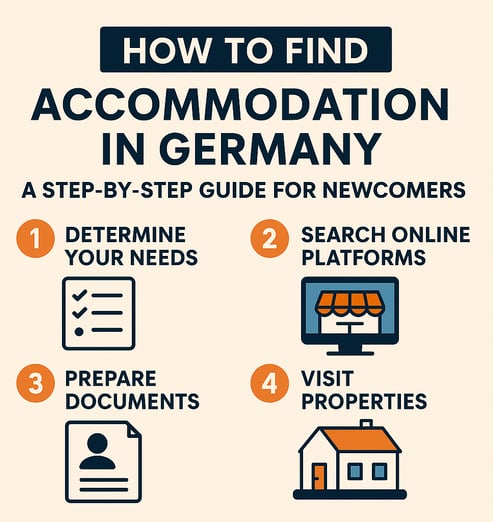How to Find Accommodation in Germany
Finding a place to live in Germany can feel like a daunting task, especially if you're new to the country, don’t speak the language fluently, or are unfamiliar with the rental system. But with the right knowledge and tools, you'll be unpacking in your new home in no time. This guide will walk you through everything you need to know to find accommodation in Germany—whether you're a student, a working professional, or a digital nomad.
TRAVEL
MJ
4/14/20252 min read


🔍 Step 1: Understand the Types of Housing
Before you start your search, it’s important to understand what kinds of housing are available:
WG (Wohngemeinschaft): Shared flats, common among students and young professionals. Cheaper and more social.
1-Zimmer-Wohnung: A private studio or one-room apartment, ideal for individuals or couples.
Furnished Apartments: Often offered short-term, great for expats or newcomers without furniture.
Unfurnished Apartments: Standard rentals. In Germany, "unfurnished" often means no kitchen appliances either!
💡 Step 2: Know Where to Search
Here are the most popular platforms to find accommodation:
WG-Gesucht.de – Ideal for shared flats and student rooms
Immobilienscout24.de – Largest real estate portal in Germany
Immonet.de / Immowelt.de – Good alternatives to widen your search
Facebook Groups – Try searching for "WG gesucht + [city]" or "Expats in [city]"
Student Housing Portals – Most universities offer dormitories or have listings
📝 Step 3: Prepare Your Documents
Competition for housing can be high, especially in big cities like Berlin, Munich, or Hamburg. Having these documents ready will help you stand out:
SCHUFA Report – A credit score used to check financial reliability
Proof of Income or bank statements
Job Contract or University Admission Letter
Personal ID or Passport Copy
Mietschuldenfreiheitsbescheinigung – Proof you don’t owe rent elsewhere (if applicable)
💬 Step 4: Reach Out and Schedule Viewings
When you message landlords or flatmates, be polite and brief. Introduce yourself, mention what you do (student, intern, employee), and explain why you're interested in the apartment. For shared flats (WGs), they might invite you to a WG-Casting, which is like a roommate interview.
Try to schedule multiple viewings and visit the neighborhood during the day and evening to get a feel for the area.
💸 Step 5: Understand Rent & Deposits
Kaltmiete: Cold rent (just the base rent, no utilities)
Warmmiete: Warm rent (includes utilities like water and heating)
Nebenkosten: Additional costs such as garbage, water, etc.
Deposit (Kaution): Usually 2–3 months' cold rent, refundable at the end of the lease
Always ask what's included and get everything in writing.
🧾 Step 6: Sign the Contract
Before signing:
Read the contract carefully (use DeepL or Google Translate if needed)
Clarify the notice period and any house rules
Get a signed confirmation of move-in (needed for city registration / Anmeldung)
🏙️ Step 7: Register Your Address (Anmeldung)
Once you’ve moved in, register your address at the Bürgeramt (citizen’s office) within 14 days. You’ll need:
Your rental contract
Confirmation from your landlord (Wohnungsgeberbestätigung)
Passport/ID
Without this, you won’t be able to open a bank account, get insurance, or apply for a residence permit.
🛑 Common Pitfalls to Avoid
Never send money before viewing the place or confirming it’s legitimate
Be cautious of offers that seem too good to be true
If a landlord refuses to provide a contract or Anmeldung form, it’s a red flag
Final Tips
Start your search early—especially before semesters or job seasons start
Be flexible with your first accommodation—it doesn't have to be forever
Consider temporary stays via Airbnb, hostels, or serviced apartments while you search
Insights
Sharing experiences to guide travelers in Europe.
Connect
Explore
© 2025. All rights reserved.